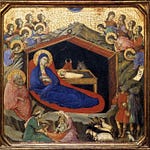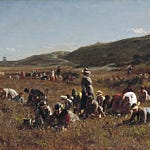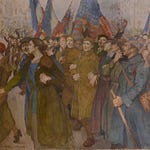A boy and a girl holding hands — when was the last time you saw it? When you saw what people as old as I am once saw all the time?
That happy feast of Saint Valentine is approaching, whose association with young love is quite ancient, far before the day was turned into a commercial opportunity for stationers and candy-makers. The poet Chaucer, in the late 1300’s, takes it for granted in his Parliament of Fowles, a charming dream-vision in which all the kinds of birds gather on St. Valentine’s day to choose a mate. So then, we thought, why not have our Word of the Week be a word having to do with falling in love? And what better word than romance?
This spring at Thales College, I’ve been teaching quite a few literary romances, from the time when that word starts to appear in various forms in the languages of Europe. Again, that’s the Middle Ages, and a romance, such as you’ll find in the incomparable Chretien de Troyes, is a story of knightly adventure, usually involving courtly love, recited or chanted as entertainment before an audience of lords and ladies and their guests, and written down too, or else we’d never know about them. You see, if you’re writing for scholars, you’re going to use Latin, because you want to reach as many of them as possible, and that was also the language people spoke in the universities, so that a fellow from Scotland could talk with a fellow from Sicily at the University of Cologne. The same was true if you were going to write for people in the religious life generally, although that begins to change in the fourteenth century, when we start to see devotional books in the vernacular. Anyhow, lords and ladies at a big feast at the court of a king or a duke don’t want their ears pummeled with Latin, and they do want to hear lively stories. Hence everybody started composing long narrative poems in the vernacular. And that’s what the word romanz meant, in Old French. It came from the late Latin phrase Romanice scribere, meaning to write in the Roman way, which meant, back when so much of western Europe had been taken over by the Goths and the Lombards (the Long-Beards) and the Franks, not in the Frankish way. For Frankish was a German language, a kind of cousin and battleax stepmother to French, whose real mother is Latin.
What do lords and ladies and knights and their squires want to hear stories about? Lords and ladies and knights and squires, and fantastical journeys, and magic potions, and strange unheard-of places, and castles with giants (who are always stupid) and dwarfs (who are always malicious), a regular fantasyland of allegory and symbolism, where the poets taught about love and all the madness we bring upon ourselves when we get love wrong, which of course, being human, we are likely to do. The finest of these romances, we now know, were actually quite profound psychologically, and firmly founded in the Christian faith, which gave to Chretien, for example, a lot of fun in showing up good old Lancelot for the fool that he was, yet with all kinds of strange and appealing indirections. Poor Lancelot, in the throes of his passion for Guenevere, twisting away the iron bars of the grille that keeps him from his love, and slicing off a whole fingertip in the act — blood everyplace, but he doesn’t feel it, because, well, he’s in love. There’s a romance for you — and I’m not talking about Lancelot’s and Guenevere’s feelings! I’m talking about Chretien’s poem of about 9000 lines.
Now that’s why, in many of the European languages, the word for a long story in prose, that is, a novel, came to be a form of the word romance: German, Russian, French, Dutch roman, Italian romanzo, Portuguese romance; but at least the Greeks buck the trend: mythistorema. But what’s the main thing you want to write a long story about? Love, of course, the love of man and woman. You don’t get far in most of the great English novels of the nineteenth century without love, and I’m not just talking about Jane Austen and the Bronte sisters here. It’s central to almost all of Dickens’ novels, and likewise with Sir Walter Scott, Anthony Trollope, George Eliot, Thomas Hardy, and even that crusty satirist William Thackeray. More power to them!
Yes, more power to them. There are ages in which the main danger to young people is that they will fall too heedlessly in love. That is not the case now. Things now are quite otherwise. One day, as I said, I saw a boy and a girl holding hands, and it struck me that I hadn’t seen such a thing in many years, even though I’d been a college professor all that time. You want to rejuvenate the culture? Make young love conceivable again. That will take a lot more than sentiment — I am quite aware of that. But a little true and innocent romance, best when it is true and innocent, would go a long way.













